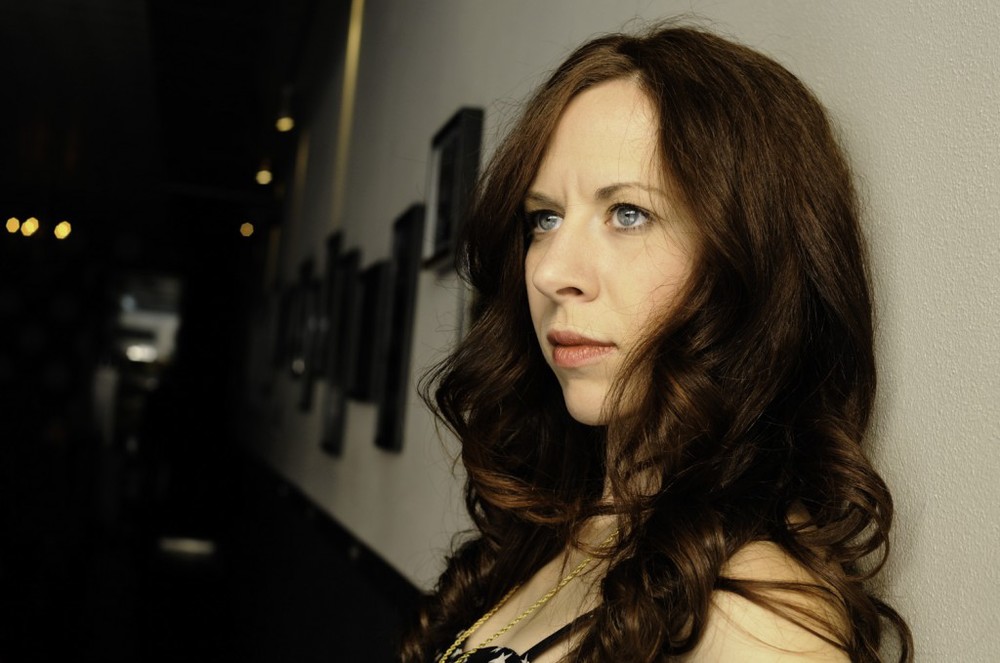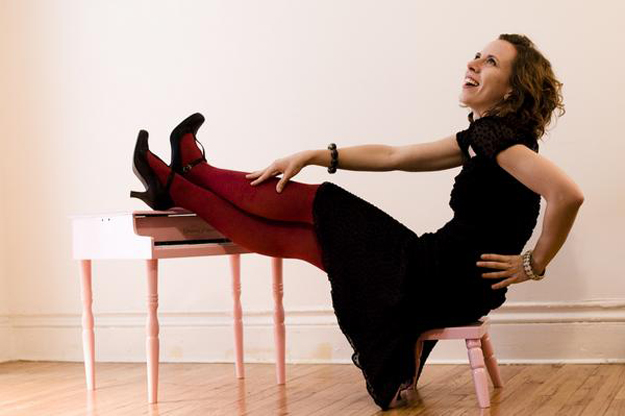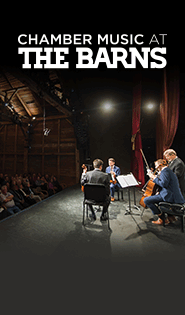Composer Missy Mazzoli is breaking the glass opera ceiling

Missy Mazzoli’s “Proving Up” will have its world premiere Friday night at Washington National Opera. Photo: Stephen S. Taylor
Missy Mazzoli became a rock star of the classical world with the success of her second opera, Breaking the Waves, premiered by Opera Philadelphia in 2016. Washington National Opera has scored a major coup by commissioning Mazzoli’s next opera for its American Opera Initiative.
The company will present the world premiere of Mazzoli’s Proving Up Friday night in the Kennedy Center Terrace Theater.
About seventy minutes in length, this one-act opera is adapted from a short story by the young American writer Karen Russell. It tells the story of the Zegner family, homesteaders who moved to Nebraska, driven by the desire to “prove up”–that is, to earn the title to their land.
In her story Russell singles out an odd requirement of the Homestead Act, that the house on the property had to have at least one glass window.
“This community of homesteaders,” says Mazzoli, “passes this one window around any time an inspector is rumored to be coming into the area to give out land titles. When the Zegners send their youngest son, Miles, to deliver the window to another homestead, he encounters what Karen Russell describes in her short story as a black-lipped sodbuster, a man who is very mysterious, speaking in this strange, distorted way.”
Because the opera takes place in Nebraska, the team approached Opera Omaha about sharing in the commission with WNO and Miller Theatre at Columbia University. “Kind of on a whim,” the composer says with a laugh, “and they loved it! Opera Omaha is an incredibly progressive, forward-looking company, and they immediately came on board as co-commissioners.”
Mazzoli explained that the commission actually came before her success with Breaking the Waves. “Francesca Zambello reached out to me years ago,” Mazzoli says, “and I’m so grateful to her. She had a lot of faith and took a risk by commissioning me. The timing just worked out to do this opera after Breaking the Waves. The opportunity to do an American story, at this point in our history especially, was very exciting.”
Was there something about Russell’s writing that seemed particularly operatic to Mazzoli? “Opera to me is very surreal,” she replies. “When everyone is singing their thoughts, it’s clear we are in a different world, not a realistic world. Karen’s work often puts you between these different layers of reality. I think this will translate really well to the stage.”
In a hallmark of her work, Russell has written a ghost story in the tradition of authors like Nathaniel Hawthorne, Edgar Allan Poe, or Henry James. The opera has some unsettling elements, like the two sisters of the protagonist, Miles. “They are dead, but they still sing in the opera,” Mazzoli describes. “They provide commentary and are in every scene, and even though Miles can see them, the rest of the family cannot. They have their own sort of particular musical language, a lot of very strange vocal techniques.”
Like all the operas sponsored by the American Opera Initiative, Mazzoli is working with a small orchestra of just thirteen people. “It’s a sort of small sinfonietta,” she says, “two brass instruments, three winds, plus the string section and a percussionist.”
The sounds of the score go far beyond that palette, however. “There’s also a harpsichord,” she adds, “because I was asking myself, what is the driest instrument out there? So much of the piece takes place in this dry, drought-ridden landscape.” She says that the harpsichord led her toward a sort of Baroque-influenced sound. “Miles sings in a sort of heightened Baroque style,” Mazzoli explains, and the ghostly sisters “both play harmonicas in addition to singing, as do some members of the orchestra.”
What is the overall sound world of the opera? “I am doing a sort of ghostly version of old-timey Americana music,” Mazzoli answers. “A lot of fiddle tunes, that are sort of warped and recontextualized in a way that is very unsettling.”
There is one other unusual timbre in the mix. “The percussionist in the orchestra will have seven guitars hanging on the wall,” she adds. “They are all tuned to open tunings, and the percussionist plays them by striking them with mallets or sticks. The idea is it’s like a wall of stuff that this family has carried with them across the prairie, which now becomes the percussion section.”
The ghost story and the unsettling musical colors sound reminiscent of Britten’s The Turn of the Screw. Was Britten one of Mazzoli’s musical influences? “It’s hard to get away from Britten if you’re writing opera in English,” she admits. “If anything inspired this opera, it was The Turn of the Screw, not only the ghost story elements, but also the sparseness of the orchestration. He was able to get so much power out of such a small group of instruments. I’ve studied that score a lot, trying to figure out how to write the most economical opera possible, how to get the largest amount of sound out of the smallest number of instruments.”

Breaking the Waves ran to two hours, fifteen minutes. Was it easier or harder to work to the hour length specified for this commission? “I guess it was easier because it was my third opera,” she says. “I had just finished Breaking the Waves, and I had a real sense of what I felt worked. Breaking the Waves was such a long process, three years of constant writing to finish. Proving Up just took me a year, so that alone made everything very different.”
Looking ahead, she already has a commission from Opera Philadelphia to do a big grand opera at the Academy of Music in 2021, and talks are in preliminary stages with a couple European companies about another opera.
One element of Mazzoli’s success may be that she has worked with the same librettist, Royce Vavrek, for all three of her operas. “We’re best friends,” she says warmly. “We talk every day. We became best friends through working. I met him at Carnegie Hall. He had written a libretto for Dog Days, David T. Little’s opera. He is so flexible. The libretto he will write for me is very different from the one he would write for David Little or for Du Yun, and that is really an incredible thing.”
In the classic battle between music and words, how does their operatic relationship work? “He’ll present a more or less finished draft to me,” she says, “and I’ll start writing. But things inevitably change, and there’s a lot of ‘Oh, well, this aria needs to be twice as long, so can you write two more verses here? Or this needs to be much shorter, or I don’t know why this is here.’ If I’m having trouble writing something, it’s usually because I’m not clear on the dramatic intention. So I’ll often go back to Royce and we’ll clarify things.”
To help other young women composers find their way, Mazzoli recently co-founded Luna Composition Lab with composer Ellen Reid. “I kept noticing two things,” she says of the classical music world. “There’s a lack of female role models in positions of mentorship and power, and there is a real lack of encouragement and opportunity for very young women in their teens, who are just at the point of deciding to be professional musicians, which is a decision you make very early.”
Luna Lab aims to fix all these problems by connecting young, female-identifying composers, ages 13 to 19, with prominent female mentors. They meet once every two weeks for lessons on Skype, and they work together to create a new piece for a concert that we hold in New York.” The program has doubled in size for its second season.
There are greater problems for women in classical music and opera as well, revealed in the past few months as women’s accusations against powerful men in most areas are finally being taken seriously. “Classical music is so slow to change,” she declares. “It’s actually no surprise to me that institutions that don’t really have any gender diversity in their staff or in their administration would have this kind of problem. It’s a place where the ‘good ol’ boy’ culture can fester and turn into something very dangerous.”
The problem, as Mazzoli sees it, is more than just equal hiring. “Right now the environment towards women in music,” she adds, “in educational institutions and in professional situations, is rife with exclusion and humiliation and disrespect. It’s a culture that starts when men are very young, and we need to address that aspect of it, not just focus on this sort of performative firing of every man who has done this sort of thing and pretend our hands are clean now.”
Opera appears to be shaping up as a major career direction for Mazzoli. While she did not set out to be an opera composer, she says that, in retrospect, it is a natural fit for her sensibility. “I didn’t really get into it until my residency with Opera Philadelphia,” she says. “That was from 2012 to 2015, and the commission for Breaking the Waves came about halfway through my residency. Being around directors and set designers and librettists fueled my love of working collaboratively.”
Had she always had an interest in opera? “It’s funny,” she confides, “I didn’t really feel like I had a way into opera early on. It sounds sort of silly, but I was really into music videos as a kid. I watched MTV for hours a day, growing up in rural Pennsylvania in the late 80s and early 90s. I was just obsessed with these things, I would put on shows and make my own music videos. That’s the world I wanted to live in.”
Washington National Opera performs Proving Up 7:30 p.m. January 19 and 2 p.m. January 21 at the Kennedy Center Terrace Theater. kennedy-center.org; 202-467-4600.



